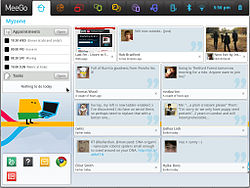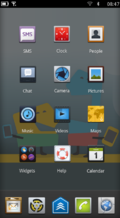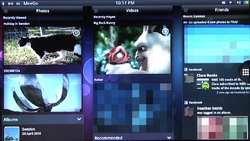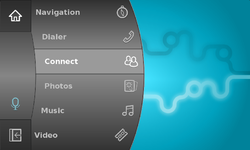- MeeGo
-
This article is about the mobile operating system. For other uses, see Meego.
MeeGo 
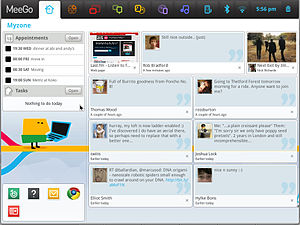
Company / developer Linux Foundation, Intel, Nokia, Novell, AMD[1]
MeeGo CommunityProgrammed in C++ OS family Linux Working state Current Initial release 26 May 2010 Latest stable release 1.2.0.3 / 11 November 2011 Marketing target Mobile Package manager RPM Package Manager Supported platforms ARM and x86 Kernel type Monolithic (Linux) License Various, see below Official website meego.com MeeGo is a Linux-based open source mobile operating system project.[2] Primarily targeted at mobile devices and information appliances in the consumer electronics market, MeeGo is designed to act as an operating system for hardware platforms such as netbooks, entry-level desktops, nettops, tablet computers, mobile computing and communications devices, in-vehicle infotainment devices, SmartTV / ConnectedTV, IPTV-boxes, smart phones, and other embedded systems.[3] MeeGo is currently hosted by the Linux Foundation.[4]
Contents
History
It was first announced at Mobile World Congress in February 2010 by Intel and Nokia in a joint press conference. The stated aim is to merge the efforts of Intel's Moblin and Nokia's Maemo former projects into one new common project. According to Intel, MeeGo was developed because Microsoft did not offer comprehensive Windows 7 support for the Atom processor.[5] Aminocom and Novell also play a large part in the MeeGo effort, working with the Linux Foundation on their build infrastructure and official MeeGo products. Amino was responsible for extending MeeGo to TV devices[6], while Novell is increasingly introducing technology that was originally developed for openSUSE, (including Open Build Service, ZYpp for package management, and other system management tools).[3][7] In November 2010, AMD also joined the alliance of companies that are actively developing MeeGo.[8]
Harmattan, originally slated to become Maemo 6, is now considered to be a MeeGo instance (though not a MeeGo product), and Nokia is giving up the Maemo branding for Harmattan and beyond (Maemo 5, aka Fremantle, and previous versions will still be referred to as Maemo).[9]
On 27 September 2011 it was announced by Intel employee Imad Sousou that in collaboration with Samsung MeeGo will be replaced by Tizen during 2012.[10][11][12][13][14][15] Nokia in turn is said to develop its own successor Meltemi targeted at feature phones.[16]
Community developers from the Mer project however plan to continue MeeGo without Intel and Nokia. So far it is not clear whether they will be allowed to continue to use the MeeGo trademark.[17][18][19]
Overview
MeeGo is intended to run on a variety of hardware platforms including handhelds, in-car devices, netbooks and televisions.[20] All platforms share the MeeGo core, with different “User Experience” (“UX”) layers for each type of device.
System requirements
MeeGo provides support for both ARM and Intel x86 processors with SSSE3 enabled [21] and uses btrfs as the default file system.[22]
User interfaces
Within the MeeGo project there are several graphical user interfaces – internally called User Experiences (“UX”).
Netbook
The Netbook UX is a continuation of the Moblin interface. It is written using the Clutter-based Mx toolkit, and uses the Mutter window manager.
MeeGo’s netbook version uses several Linux applications in the background, such as Evolution (Email, calendar), Empathy (instant messaging), Gwibber (microblogging), Chromium (web browser), and Banshee (multimedia player), all integrated into the graphical user interface.
Handset
The Handset UX is based on Qt, but GTK+ and Clutter will be included to provide compatibility for Moblin applications.[21] To support the hundreds of Hildon-based Maemo applications, users have to install the Hildon library ported by the maemo.org community. Depending on the device, applications will be provided from either the Intel AppUp or the Nokia Ovi digital software distribution systems.[23]
The MeeGo Handset UX’s “Day 1” prerelease was on June 30, 2010. The preview was initially available for the Aava Mobile Intel Moorestown platform, and a ‘kickstart’ file provided for developers to build an image for the Nokia N900.[24][25]
Hand phone
Use in Nokia N9, N900, N950
Tablet
Intel demonstrated the Tablet UX on a Moorestown-based tablet PC at COMPUTEX Taipei in early June 2010.
Since then, some information appeared on MeeGo website indicating there will be a Tablet UX part of the MeeGo project, but it is not known if this UX will be the one demonstrated by Intel. This Tablet UX will be fully open source like the rest of the MeeGo project and will be coded with Qt and the MeeGo Touch Framework.[26] Intel has revealed interest in combining Qt with Wayland display server instead of the often seen Qt/X11 combination in MeeGo Touch in order to utilize the latest graphics technologies supported by Linux kernel, which should improve user experiences and reduce system complexity.[27][28]
Minimum hardware requirements are currently unknown.
The WeTab runs MeeGo with a custom user interface and has been available since September 2010[29]
In-Vehicle Infotainment
The GENIVI Alliance, a consortium of several car makers and their industry partners, uses Moblin with Qt as base for its 'GENIVI 1.0 Reference Platform' for In-Vehicle Infotainment (IVI) and automotive navigation system as a uniformed mobile computing platform. Graham Smethurst of GENIVI Alliance and BMW Group announced in April 2010 the switch from Moblin to MeeGo.[30][31]
Smart TV
Is a settop box project for using meego for iptv. [32]
Licenses
As of July 2010, the access rights for the MeeGo framework and over 90% of the source code are under the GNU General Public License (GPLv3 & GPLv2).
MeeGo is a complex project that involves many vendors and organizations. Its license policy is mainly documented at the “MeeGo License Policy”[33] page. Consider the nature of MeeGo’s targeting markets – the mobile and handset sectors – which, unlike the desktop software market that tends to adopt one or two major software vendors’ operating systems, is highly diversified and hence differentiation is taken as of vital importance by both device makers and software vendors[citation needed]. Therefore MeeGo’s license policy is, at one hand, trying to encourage the fostering of derivative work while at the same time, keep the project as open as possible.[citation needed]
From the distribution point of view, MeeGo is a collection of open source software, which are distributed conforming to their respective licenses.
From the development point of view, which mainly addresses the way of adopting software from the free software community on account of license, MeeGo software can be classified into two categories: the Operating System (OS) software and User Experience (UX) software. The OS software should[clarification needed] mainly[quantify] be using a copyleft license to ensure the openness of the underlying system, while the UX software could be of BSD-style licenses, which do not mandate code modifications to be open sourced.[33]
The licenses of MeeGo developed technologies, such as fast-boot, power and speed optimizations are of interest to derivative products and projects. Those technologies spread among the system and can’t be easily isolated out. For example, the fast-boot technology consists mainly of the fast and small Syslinux bootloader,[34] a new system service and software launcher called "uxlaunch", the optimized read-ahead component, little tweaking and tuning among many software services. The license policy is that these changes should follow the base work’s license upon which they are made, that is to say, the corresponding upstream project’s license policy. For example, MeeGo’s work on the Linux kernel is available under the license of the Linux kernel.
Technical foundations
Core OS
The MeeGo Core operating system is a Linux distribution, drawing on[vague] Nokia’s Debian-based Maemo and Intel’s Fedora-based Moblin.[35] MeeGo is one of the first Linux distributions to use the Btrfs file system as default, and uses RPM repositories.
Architecture
Software development
The officially endorsed way to develop MeeGo applications is to use the Qt framework and Qt Creator as development environment, but writing GTK applications is also supported.[36]
openSUSE’s Build Service is used to compile the applications.[37]
Derivatives
As with Moblin before, MeeGo also serves as a technology pool that software vendors can access to build their products from. So far only ports of the graphical user interfaces to other Linux distributions have been announced.
MeeGo/Harmattan
Even though MeeGo was initiated as collaboration between Nokia and Intel, the collaboration was formed when Nokia was already developing the next incarnation of its Maemo Linux distribution. As a result, the Maemo 6 base operating system will be kept intact while the Handset UX will be shared, with the name changed to “MeeGo/Harmattan”.[9]
On June 21st 2011, Nokia announced its first MeeGo/Harmattan smartphone device, Nokia N9. [38]
SUSE and Smeegol Linux
On June 1st, 2010, Novell announced that they would ship a SUSE Linux incarnation with MeeGo’s Netbook UX (MeeGo User Experience) graphical user interface.[39]
A MeeGo-based Linux distribution with this user interface is already available from openSUSE's Goblin Team under the name Smeegol Linux, this project combines MeeGo with openSUSE to get a new netbook-designed Linux distribution. What makes Smeegol Linux unique when compared to the upstream MeeGo or openSUSE is that this distribution is at its core based on openSUSE but has the MeeGo User Experience as well as a few other changes such as adding the Mono-based Banshee media player, NetworkManager-powered network configuration, a newer version of Evolution Express, and more. Any end-users can also build their own customized Smeegol Linux OS using SUSE Studio.[40][7]
Fedora
Fedora 14 contains a selection of software from the MeeGo project.[41]
Linpus
Linpus Technologies is working on bringing their services on top of MeeGo Netbook and MeeGo Tablet.[42][43]
Splashtop
The latest version of the instant-on OS Splashtop-platform (by Splashtop Inc. which was previously named DeviceVM Inc.) is compliant with MeeGo, and future version of Splashtop will be based on MeeGo and will be available for commercial use in the first half of 2011.[44][45]
Release Schedule
It was announced at the Intel Developer Forum 2010 that MeeGo would follow a six month release schedule. Version 1.0 for Atom netbooks and a code drop for the Nokia N900 became available for download as of Wednesday, 26 May 2010[update].
Version Kernel version Release date Notes Devices Supported (Netbooks) Devices Supported (Handsets) Codename 1.0 2.6.33[46] 26 May 2010[47] Primarily a Netbook release; only a code drop was released for mobile devices (the Nokia N900). Asus EeePC 901, 1000H, 1001P, 1005HA, 1005PE, 1008HA, Eeetop ET1602, Dell mini10v, Inspiron Mini 1012, Acer Aspire One D250, AO532-21S, Revo GN40, Aspire 5740-6025, Lenovo S10, MSI U100, U130, AE1900, HP mini 210-1044, Toshiba NB302. Nokia N900 (No handset UX). Arlington 1.0.1 2.6.33.5[48] July 2010[48] Update to MeeGo 1.0; Kernel updated to 2.6.33.5, USB device loading time improved, improved 3D performance, browser enhancements, resolved multiple e-mail client issue, enhanced netbook window manager, improved visuals, full support for GNOME proxy configuration in the media player, more control over DNS settings.[48] All Netbooks supported by MeeGo 1.0; see above. None Boston 1.0.2 2.6.33.5[49] 9 August 2010[49] Update to MeeGo 1.0; X-Server Update, Connection Manager Update, Package Manager UI Update, Perl Update and several more.[49] All Netbooks supported by MeeGo 1.0; see above. None Cupertino 1.0.3 2.6.33.5[50] 10 September 2010[50] Update to MeeGo 1.0; several Updates, e.g. Chromium browser, Connection Manager[50] All Netbooks supported by MeeGo 1.0; see above. None Dallas 1.0.4 2.6.33.5[51] 12 October 2010[51] Update to MeeGo 1.0; several security updates, better support for Lenovo S10-3, ...[51] All Netbooks supported by MeeGo 1.0; see above. None Emeryville 1.0.5 Unknown[51] 28 November 2010[51] MeeGo core update.[52] All Netbooks supported by MeeGo 1.0; see above. None Fairbanks 1.0.6 Unknown[51] 4 January 2011[51] MeeGo core update.[53] All Netbooks supported by MeeGo 1.0; see above. None Georgetown 1.0.7 Unknown[51] 24 February 2011[51] MeeGo Netbook software update.[54] All Netbooks supported by MeeGo 1.0; see above. None Honolulu 1.1 2.6.35[55] 28 October 2010[56] Touch-based devices support proposed with the Handset UX [57] Unknown Aava and Nokia N900 Irvine 1.1.1 2.6.35[58] 28 November 2010[58] Several Fixes and Updates[58] Unknown Aava and Nokia N900 Jefferson 1.1.2 2.6.35[59] 07 January 2011[59] Several security issues fixed, update syncevolution and connman[59] Unknown Knoxville 1.1.3 2.6.35[60] 24 February 2011[60] Fixed many important security issues, enabled all programs to access remote files over network and updated translation[60] Unknown Lakeside 1.1.99 2.6.35[60] 24 February 2011[60] Beta testing of MeeGo 1.2 for Nokia N900 and other handsets.[61] Unknown Mallard 1.2 2.6.37[62] 19 May 2011 Unknown Nokia N950 (developers only) and Nokia N9 Newark 1.3 2.6.37 October 2011 Unknown Otsego Project planning
Launch
In February 2011, Nokia announced a partnership with Microsoft for mobile handsets[63] and the departure of Nokia's MeeGo team manager Alberto Torres,[64] leading to speculation as to Nokia's future participation in MeeGo development or using Windows Phone by Nokia.
In September 2011, Nokia has begun shipments the first Nokia N9 MeeGo smartphone model, ahead of the Windows Phone 7 launch expected later this year.[65][66] First MeeGo based tablet WeTab was launched in 2010 by Neofonie.
Companies supporting project
Company Industry Support for MeeGo Targeted Device Acer Computer systems and Hardware Iconia M500 tablet will run MeeGo[67] Tablets and Notebooks AMD Computer systems and Hardware Will contribute Engineering resources to the open source MeeGo project [68] Laptops and PCs Amino Home Entertainment The Amino Freedom Jump and Freedom Media Centre products are based on MeeGo[69] Set Top Box Asus Computer Systems and Hardware The Asus Eee PC X101 will have a MeeGo operating system option[70] Laptop Asianux Software The MeeGo version of the Midinux 3.0 tablet is based on Asianux Linux [71] Tablet basysKom Software Consulting Is working on a MeeGo Tablet User Interface[72] Tablet Collabora Software Provide Consulting for MeeGo[73] None CS2C Software They are creating a MeeGo Tablet[74] Tablet DeviceVM Computer and Software Uses MeeGo for Splash Top PC's[75] PC EA Mobile Gaming Verbally supports MeeGo and has declared its intention to use it for future mobile games [76] Tablets and Smart Phones Gameloft Gaming Verbally supports MeeGo and has declared its intention to use it for future mobile games [77] Tablets and Smart Phones GENIVI Alliance Auto Has standardized on MeeGo for auto infotainment (IVI) system. [78] IVI GM Auto Member of the GENIVI Alliance that has standardized on MeeGo for Automobil Infotainment Systems (IVI)[79] IVI Hancom Computer Software[80] Plans to spread MeeGo to the Korean market PC and Laptop Igalia Software Consulting Development of MeeGo and Sponsor of MeeGo at the Dublin 2010 conference[81] From Mobile devices to Desktop Integrated Computer Solutions Software Consulting Develops custom software for MeeGo device suppliers[82]. Embedded and Mobile devices Intel Semiconductors Core sponsor and developer of MeeGo Smart Phones Jaguar Land Rover Auto They plan to use MeeGo for their New car Infotainment[83] IVI Lanedo Software Consulting Software Development of MeeGo and Sponsor of MeeGo at the San Francisco 2011 conference[84] Embedded device to desktops Linaro Software Optimises MeeGo for high performance on ARM [85] Mobile-devices Linpus Software OS Created the Linpus Lite Computer with a MeeGo OS[86]] Laptops and Netbooks Mandriva Software Industry The Mandriva minis will run on MeeGo[87] PC and Laptops Metasys Computer and Software Uses a MeeGo based operating system[88] Laptop PC Nokia Telecommunications and Computer Software Nokia currently has two MeeGo handsets planned, the N9 and N950. Smart Phones PixArt Software Development Provides an operating system for the Intel Atom Processor[89] Desktop PCs PSA Peugeot Citroen Auto Manufacturing They plan to use MeeGo for their New car Infotainment[90] IVI Red Flag Linux OS Plans on incorporating portions of MeeGo (is it the UI) into their Linux distribution. [91] Tablet and IVI ST-Ericsson Wireless Semi Conductor The U8500 Platform will include MeeGo[92] Smart Phones Tencent Online Service Provider Plans to work on Next gen mobile devices and apps, using MeeGo[93] Smart Phones TurboLinux Linux OS TurboLinux has expressed its support for MeeGo[94] Smart Phones Wind River Mobile Software Owned by Intel, plans on porting MeeGo to other platforms. [95] Smart Phones More companies can be found in http://meego.com/about/public-support-meego and http://www.linuxfoundation.org/node/6144.
See also
- Moblin - Intel's former mobile operating system project before it and Nokia's Maemo was joined into one the new common MeeGo project.
- Maemo - Nokia's former mobile operating system project before it and Intel's Moblin was joined into one the new common MeeGo project.
- Mobile operating system
- Mobile computing
- SmartTV
References
- ^ "AMD to contribute to MeeGo development". The H open. 2010-11-15. http://www.h-online.com/open/news/item/AMD-to-contribute-to-MeeGo-development-1136583.html. Retrieved 2011-01-27.
- ^ Grabham, Dan (2010-02-15). "Intel and Nokia merge Moblin and Maemo to form MeeGo". techradar.com. http://www.techradar.com/news/phone-and-communications/mobile-phones/intel-and-nokia-merge-moblin-and-maemo-to-form-meego-670302. Retrieved 15 February 2010.
- ^ a b "openSUSE News - Announcing Smeegol 1.0". http://news.opensuse.org/2010/10/06/announcing-smeegol-1-0/. Retrieved 2010-10-06.
- ^ "FAQ on MeeGo website, retrieved 29 May 2010". Meego.com. http://meego.com/about/faq. Retrieved 2010-12-08.
- ^ "Intel: MeeGo exists because Microsoft let us down". TechRadar. 20 April 2010. http://www.techradar.com/news/computing-components/processors/intel-meego-exists-because-microsoft-let-us-down-684665.
- ^ "MeeGo Partner - Amino". MeeGoZone. 11 April 2011. http://www.youtube.com/watch?v=DW1NCVvG3DM.
- ^ a b "openSUSE Releases MeeGo-based Smeegol Linux". http://www.phoronix.com/scan.php?page=news_item&px=ODY1Ng. Retrieved 2010-10-06.
- ^ "AMD will contribute 'engineering expertise' to MeeGo development project". Engadget. 2010-11-15. http://www.engadget.com/2010/11/15/amd-will-contribute-engineering-expertise-to-meego-development/. Retrieved 2010-12-08.
- ^ a b ""maemo.org - Talk - Renaming Maemo 6 to MeeGo/Harmattan"". http://talk.maemo.org/showpost.php?p=529073&postcount=14. Retrieved 2010-02-27.
- ^ Paul, Ryan. "MeeGo rebooted as Intel and Samsung launch new Tizen platform". Ars Technica. http://arstechnica.com/open-source/news/2011/09/meego-rebooted-as-intel-and-samsung-launch-new-tizen-platform.ars. Retrieved 28 September 2011.
- ^ http://www.engadget.com/2011/09/28/meego-to-be-folded-into-linux-based-tizen-os-slated-to-arrive-i/ MeeGo to be folded into Linux-based Tizen OS, slated to arrive in 2012
- ^ http://thisismynext.com/2011/09/28/meego-dead-meet-tizen-open-source-os-based-linux/ MeeGo is dead: Meet Tizen, another new open source OS based on Linux
- ^ https://meego.com/community/blogs/imad/2011/whats-next-meego What's Next for MeeGo
- ^ http://www.phoronix.com/scan.php?page=news_item&px=OTk1Mg Tizen Is Announced; MeeGo Will Transition To It
- ^ http://www.tizen.org Tizen Official Website
- ^ http://www.theregister.co.uk/2011/10/05/nokia_meltemi_for_s40/
- ^ http://bergie.iki.fi/blog/where_is_the_future_for_openness_in_mobile/
- ^ http://lists.meego.com/pipermail/meego-dev/2011-October/484215.html
- ^ http://www.phoronix.com/scan.php?page=news_item&px=MTAwMzE MeeGo Community Investigates Tizen Alternatives
- ^ "Devices". MeeGo. http://meego.com/devices. Retrieved 2010-12-08.
- ^ a b "MeeGo FAQ". http://meego.com/about/faq. Retrieved 2010-02-15.
- ^ "MeeGo project chooses Btrfs as standard file system". The H. 12 May 2010. http://www.h-online.com/open/news/item/MeeGo-project-chooses-Btrfs-as-standard-file-system-999051.html.
- ^ "MeeGo Press Release". http://www.intel.com/pressroom/archive/releases/2010/20100215corp.htm. Retrieved 2010-02-15.
- ^ "MeeGo Handset UX Day 1 Blog Post". http://meego.com/community/blogs/valhalla/2010/meego-handset-project-day-1-here. Retrieved 2010-06-30.
- ^ "MeeGo Handset UX Developer Preview". http://meego.com/downloads/releases/1.0.80.8/meego-handset-day1-developer-preview. Retrieved 2010-06-30.
- ^ "MeeGo tablet UX". http://forum.meego.com/showthread.php?t=1281. Retrieved 2010-08-31.
- ^ Michael Larabel (September 16, 2010). "Where Wayland May First Appear In Use By A Distro". Phoronix. http://www.phoronix.com/scan.php?page=news_item&px=ODYwMQ. Retrieved 11 October 2010.
- ^ Michael Larabel (September 21, 2010). "Qt Is Now Drawing On Wayland". Phoronix. http://www.phoronix.com/scan.php?page=news_item&px=ODYyNQ. Retrieved 11 October 2010.
- ^ "WeTab is based on MeeGo". The H. October 13, 2010. http://wetab.mobi/en/faqsen.
- ^ "Linux Foundation Press Releases » Blog Archive » Public Support for the MeeGo Project". Linux-foundation.org. http://linux-foundation.org/weblogs/press/2010/04/12/public-support-for-the-meego-project/. Retrieved 2010-12-08.
- ^ http://www.linuxfordevices.com/c/a/News/Genivi-selects-MeeGo/
- ^ "MeeGo Smart TV". http://wiki.meego.com/MeeGo_Smart_TV_for_Trimslice.
- ^ a b "MeeGo License Policy". http://meego.com/about/licensing-policy. Retrieved 2010-07-07.
- ^ "Syslinux Wiki". Syslinux.zytor.com. http://syslinux.zytor.com/wiki/index.php/The_Syslinux_Project. Retrieved 2010-12-08.
- ^ "Intel switches from Ubuntu to Fedora for Mobile Linux". http://www.h-online.com/open/news/item/Intel-switches-from-Ubuntu-to-Fedora-for-Mobile-Linux-736599.html. Retrieved 2010-06-21.
- ^ "MeeGo Netbook and GTK - MeeGo wiki". Wiki.meego.com. 2010-08-19. http://wiki.meego.com/MeeGo_Netbook_and_GTK. Retrieved 2010-12-08.
- ^ "Build Infrastructure - MeeGo wiki". Wiki.meego.com. 2010-11-20. http://wiki.meego.com/Build_Infrastructure. Retrieved 2010-12-08.
- ^ "Introducing the Nokia N9: all it takes is a swipe!". Nokia Corporation. http://conversations.nokia.com/2011/06/21/introducing-the-nokia-n9-all-it-takes-is-a-swipe/. Retrieved 2011-06-21.
- ^ "Novell Announces Support for MeeGo". http://www.novell.com/news/press/novell-announces-support-for-meego. Retrieved 2010-06-21.
- ^ "openSUSE MeeGo repo". http://download.opensuse.org/repositories/Meego:/. Retrieved 2010-06-21.
- ^ Changes in Fedora for Desktop Users
- ^ "Linpus Lite for MeeGo". http://www.linpus.com/news/2010/08/31.html. Retrieved 2010-08-31.
- ^ "Slides about Linpus Lite MeeGo". http://www.youtube.com/watch?v=V-_uwrhFIAA. Retrieved 2010-08-31.
- ^ "DeviceVM Goes MeeGo-Compliant with Splashtop Product". http://www.businesswire.com/news/home/20100914005686/en. Retrieved 2010-09-14.
- ^ "Remember SplashTop? Here's An Update On Them". Phoronix.com. 2010-10-30. http://www.phoronix.com/scan.php?page=news_item&px=ODczNw. Retrieved 2010-12-08.
- ^ "Intel and Nokia release MeeGo v1.0", The H, 27 May 2010, http://www.h-online.com/open/news/item/Intel-and-Nokia-release-MeeGo-v1-0-1008900.html
- ^ "MeeGo at IDF. Netbook and Handheld Eye Candy, Chrome, Fennec and Lots of Developer Details", Carrypad, 13 April 2010, http://carrypad.com/2010/04/13/meego-at-idf-netbook-and-handheld-eye-candy-chrome-fennec-and-lots-of-developer-details/
- ^ a b c "MeeGo 1.01 for Netbooks update", All About MeeGo, July 12, 2010, http://www.allaboutmeego.com/news/item/11800_MeeGo_101_for_Netbooks_update_.php
- ^ a b c MeeGo v1.0.2 Core Update, September 21, 2010, http://meego.com/downloads/releases/updates/meego-v1.0.2-core-update
- ^ a b c MeeGo v1.0.3 Core Update, September 21, 2010, http://meego.com/downloads/releases/updates/meego-v1.0.3-core-update
- ^ a b c d e f g h i MeeGo v1.0.4 Core Update, October 19, 2010, http://meego.com/downloads/releases/updates/meego-v1.0.4-core-update
- ^ MeeGo v1.0.5 Core Update | MeeGo
- ^ MeeGo v1.0.6 Core Update | MeeGo
- ^ MeeGo v1.0.7 Netbook Update | MeeGo
- ^ "MeeGo project releases preview source code", The Tech Journal, July 2, 2010, http://thetechjournal.com/electronics/tablet/meego-project-releases-early-handset-code.xhtml
- ^ "MeeGo 1.1 Release". MeeGo.com. October 28, 2010. http://meego.com/community/blogs/valhalla/2010/meego-1.1-release.
- ^ "MeeGo v1.0 Core Software Platform & Netbook User Experience project release". Meego.com. http://meego.com/community/blogs/imad/2010/meego-v1.0-core-software-platform-netbook-user-experience-project-release/. Retrieved 2010-12-08.
- ^ a b c "MeeGo v1.1.1 Core Update". Dezember 7, 2010. http://meego.com/downloads/releases/updates/meego-v1.1.1-core-update.
- ^ a b c "MeeGo v1.1.2 Core Update". January 12, 2011. http://meego.com/downloads/releases/updates/meego-v1.1.2-core-update.
- ^ a b c d e "MeeGo v1.1.3 Core Update". March 16, 2011. http://meego.com/downloads/releases/updates/meego-v1.1.3-core-update.
- ^ http://www.youtube.com/watch?v=Q4vN_Xn0jq0
- ^ "MeeGo v1.2 Core Update". May 20, 2011. https://meego.com/downloads/releases/1.2/meego-v1.2-core-software-platform.
- ^ "Nokia and Microsoft form partnership". BBC News. 2011-02-11. http://www.bbc.co.uk/news/business-12427680.
- ^ "Nokia execs reshuffled in Microsoft-centered Elopcalypse". Engadget.com. 2011-02-11. http://www.engadget.com/2011/02/11/nokia-execs-given-the-boot-in-microsoft-centered-reorganization/.
- ^ "Nokia ships N9 smartphone with MeeGo open OS". September 27, 2011. http://www.theglobeandmail.com/news/technology/mobile-technology/nokia-ships-n9-smartphone-with-meego-open-os/article2181422/?utm_medium=Feeds%3A%20RSS%2FAtom&utm_source=Home&utm_content=2181422.
- ^ Engadget: Nokia's N9 official: a luscious slab of MeeGo coming later this year, Nokia N9.
- ^ "All About MeeGo". Acer Iconia M500 - MeeGo tablet shown at Computex. http://www.allaboutmeego.com/news/item/12950_Acer_Iconia_M500-MeeGo_tablet_.php. Retrieved 6/14/11.
- ^ "PC Mag". AMD Backs MeeGo OS Project. http://www.pcmag.com/article2/0,2817,2372740,00.asp. Retrieved 6/14/11.
- ^ "Amino and MeeGo - Optimised for entertainment". Aminocom.com. http://www.aminocom.com/what-we-offer/amino-and-meego/. Retrieved 6/9/11.
- ^ "Tlvk.com". Netbook Asus Eee PC X101 the latest Slim Sexy light with Meego. http://tlvk.com/2011/the-netbook-asus-eee-pc-x101-the-latest-slim-sexy-light-with-meego-price-200-usd-only.html. Retrieved 6/9/11.
- ^ "MeeGo tablet unveiled in China". MeeGoexperts.com. http://www.meegoexperts.com/2010/11/meego-tablet-unveiled-china/. Retrieved 6/9/11.
- ^ "Ubergizmo". Basyskom shows off new MeeGo UI design. http://www.ubergizmo.com/2011/05/basyskom-shows-off-new-meego-ui-design/. Retrieved 6/9/11.
- ^ "Collabora". Long-Time Open Source Contributor Collabora Joins Linux Foundation. http://www.collabora.com/press/2010/04/join-linux-foundation.html. Retrieved 6/9/11.
- ^ "Cs2c". CS2C releases tablet solution based on MeeGo. http://www.cs2c.com.cn/news.php?id=286. Retrieved 6/9/11.
- ^ Hollister, Sean. "Engadget". DeviceVM unleashing MeeGo on Splashtop PCs, flexes MeeGo netbook muscle to remote control Windows machines (video). http://www.engadget.com/2010/09/15/devicevm-unleashing-meego-on-splashtop-pcs-flexes-meego-netbook/. Retrieved 6/9/11.
- ^ "Linux Foundation". Public Support for the MeeGo Project. http://www.linuxfoundation.org/node/6144. Retrieved 6/9/11.
- ^ "Linux Foundation". Public Support for the MeeGo Project. http://www.linuxfoundation.org/node/6144. Retrieved 6/9/11.
- ^ Electronista Staff. "Electronista". BMW, GM, others choose MeeGo for in-car computers. http://www.electronista.com/articles/10/07/23/meego.to.reach.in.car.entertainment.systems/. Retrieved 6/9/11.
- ^ Electronista Staff. "Electronista". BMW, GM, others choose MeeGo for in-car computers. http://www.electronista.com/articles/10/07/23/meego.to.reach.in.car.entertainment.systems/. Retrieved 6/9/11.
- ^ "Linux Foundation". Public Support for the MeeGo Project. http://www.linuxfoundation.org/node/6144. Retrieved 6/9/11.
- ^ "Igalia". Igalia sponsors the first MeeGo Conference. http://www.igalia.com/nc/igalia-247/news/item/igalia-sponsors-the-first-meego-conference/. Retrieved 6/9/11.
- ^ "ICS.com". MeeGo Development. http://www.ics.com/services/meego/. Retrieved 6/17/11.
- ^ "switchautomation". Why Meego Matters. http://www.switchautomation.com/blog/index.php/why-meego-matters/. Retrieved 6/9/11.
- ^ "Lanedo". Sponsoring MeeGo conference. http://www.lanedo.com/news.html#MeeGoConf2011. Retrieved 1/4/11.
- ^ "Linaro.org". Linaroâ„¢ Update Power point. http://www.linaro.org/assets/PDF/Linaro-updateQ310.pdf. Retrieved 6/14/11.
- ^ "Linpus". Linpus Lite for MeeGo. http://www.linpus.com/products_meego_net.html. Retrieved 6/9/11.
- ^ "MeeGo Zone". Mandriva Mini. http://meegozone.com/partners/mandriva/. Retrieved 6/9/11.
- ^ "Metasys". Metasys Announces MeeGo-Based Operating System. http://www.metasys.com.br/index.php?option=com_content&view=article&id=405%3Ameego01&catid=40%3Anoticias-en&Itemid=50&lang=en. Retrieved 6/9/11.
- ^ "Intel". Open Source Software. http://software.intel.com/sites/oss/ecosystem/pixart.php. Retrieved 6/9/11.
- ^ TN. "Telematics News". GENIVI Alliance chooses MeeGo for next-gen infotainment platforms. http://telematicsnews.info/2010/07/26/genivi-alliance-chooses-meego-for-next-gen-infotainment-platforms/. Retrieved 6/9/11.
- ^ Melanson, Donald. "Engadget". Red Flag Software, others announce MeeGo-based operating systems. http://www.engadget.com/2011/05/23/red-flag-software-others-announce-meego-based-operating-systems/. Retrieved 6/9/11.
- ^ "MeeGo.com". ST-Ericsson U8500 Linaro and MeeGo. http://conference2010.meego.com/session/st-ericsson-u8500-linaro-and-meego. Retrieved 6/9/11.
- ^ Owen, Fletcher. "PC World". Intel Teams With China's Tencent on MeeGo Mobile OS. http://www.pcworld.com/article/194098/intel_teams_with_chinas_tencent_on_meego_mobile_os.html. Retrieved 6/9/11.
- ^ "Linux Foundation". Public Support for the MeeGo Project. http://www.linuxfoundation.org/node/6144. Retrieved 6/9/11.
- ^ "Wind River". WindRiver Solutions for the Mobile Market. http://www.windriver.com/solutions/mobile-devices/meego.html. Retrieved 6/9/11.
External links
Mobile operating systems Unix-like Linux-based- Access Linux
- Android
- bada
- Tizen
- MeeGo
- Moblin
- Maemo
- Qt Extended
- Openmoko Linux
- Qt Extended Improved
- Ångström Linux-based
- OPhone
- SHR
- webOS
- Discontinued:
- DSLinux
- Familiar
- iPodLinux
- Mobilinux
- MotoMagx
- Ubuntu Mobile/Kubuntu Mobile
Other- BlackBerry Tablet OS
- iOS
Other - Windows CE
- Windows Mobile
- Windows Phone
- BlackBerry OS
- GEOS
- Nintendo DSi
- Nintendo 3DS
- Nokia OS
- S30
- S40
- PSP
- Symbian
Related platforms Linux operating system Linux Adoption (Adopters) · Criticism (of desktop Linux) · History · Kernel (kernel names · supported architectures) · Linus' Law · Linux Foundation · Linux-libre · Tux · vmlinux
Distribution GNU Free Software Foundation · GNU · GNU GPL · GNU/Linux naming controversy · GNU packages · GNU ProjectWindow manager User interface Applications People Media Lists System arrangement
and featuresMobile Access Linux Platform · Android · Ångström · bada · LiMo Foundation · LiMo Platform · Linux Phone Standards Forum · MeeGo (Maemo · Moblin) · Mobilinux · Open Handset Alliance · Openmoko · OPhone · webOS · SHR · Ubuntu MobileOther topics Linux conference · Linux Documentation Project · Malware · Linux Standard Base · Linux User Group (LUG) · Revolution OS · SCO and Linux · Tanenbaum–Torvalds debate · The CodeTechnologies - Meta-object System
- Phonon
- QML
- QtScript
- Qt Quick
- Qt Style Sheets
- Signals and slots
Tools - qmake
- Qt Creator
Bindings - PHP-Qt
- PyQt
- PySide
- QtRuby
- Qt Jambi
Related topics - KDE
- MeeGo
- Qt Development Frameworks
- Necessitas SDK (Android)
Categories:- Mobile operating systems
- Nokia
- Intel Corporation
- Linux distributions
- Mobile phone operating systems
- Smartphones
- MeeGo
- MeeGo software
- MeeGo devices
- MeeGo (operating system)
Wikimedia Foundation. 2010.

